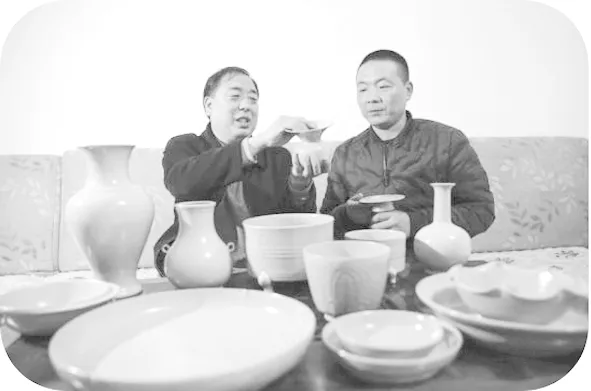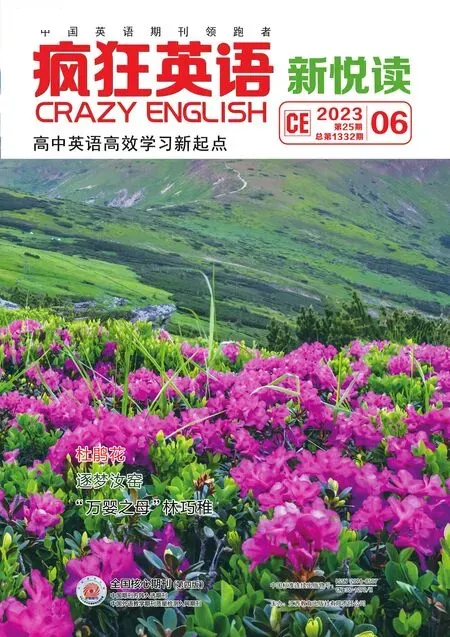逐梦汝窑
江西 黄舒伟
汝窑,因窑址位于宋时河南汝州境内而得名,今河南省汝州市张公巷和宝丰县大营镇清凉寺村均发现有汝窑烧造。汝窑位居宋代“汝、官、哥、钧、定”五大名窑之首,中国陶瓷史上也素有“汝窑为魁”的说法。

主题语境:传统瓷器制作 篇幅:362词 建议用时:7分钟

1The Ru porcelain kiln(窑)is one of the top five kilns in China.It gets its name from the location in which it has been made:Ruzhou in Henan.
2Wang Junzi, who is in his 60s, spends most of his time around the kiln and is teaching his apprentices to grasp the finesse required to produce perfect porcelain works so they can carry forward the Ru porcelain firing craft,which was listed as a national intangible cultural heritage in 2011.
3In 1987, porcelain experts from the Shanghai Museum confirmed Qingliang Temple as home to the official Ru porcelain kiln.Wang was on the scene,when the big ancient kiln site was unearthed and was stunned by the large quantity of porcelain pieces.Driven by his fascination with porcelain, he viewed the archaeologists as teachers and voluntarily helped with their work.
4In the same year,Wang began learning the art of porcelain-making from experienced artisans at the county's purple clay factory, which was helpful for his craftsmanship before he got started on learning to make Ru porcelain.
5“I believed that since the Ru Porcelain Kiln Site sits at Qingliang Temple, most of the raw materials must be nearby.So, I rode my motorcycle, with plenty of food packed, to search everywhere, and I traveled across mountains in a radius of about 200 kilometers,”he says.Wang climbed the mountains to collect the materials, even injuring his waist and legs in the process.The raw materials for firing Ru porcelain were all sourced from these trips to the local mountains.After collecting enough information, Wang started to try his hand at firing Ru porcelain in his homebuilt kiln in 1998.
6In recent years,Wang has finished Ru porcelain works in more than 50 classic forms.His works have made their way to various exhibitions at home and abroad,such as the Traditional Chinese Craft Invitational Exhibition held by the Ministry of Culture and Tourism and the Shanghai government last year.It didn't take long before his products were being sought after.Wang Junzi was named an inheritor of national intangible cultural heritage for his skill in firing Ru porcelain by the Ministry of Culture and Tourism in 2018.
Reading Check
Detail 1.What can we know about Ru porcelain?
A.It's the best porcelain in China.
B.Its name is related to a place.
C.Its firing craft has disappeared for a long time.
D.It was listed as a national intangible cultural heritage in 1986.
Detail 2.How did Wang feel while seeing the porcelain pieces unearthed in Qingliang Temple?
A.Confused.B.Content.
C.Surprised.D.Doubtful.
Gist 3.What does paragraph 5 mainly talk about?
A.Wang's daily transport.
B.Wang's voluntary work for archaeologists.
C.Wang's life experiences in Qingliang Temple.
D.Wang's efforts to collect raw materials for Ru porcelain.
Inference 4.What can be inferred about Wang from paragraph 6?
A.He has created about 50 works so far.
B.His works are more and more famous at home and abroad.
C.He used to climb mountains to relax himself.
D.He was named an inheritor of national intangible cultural heritage in 1998.
Language Study
Ⅰ.日积月累
porcelainn.瓷器
graspv.抓住;掌握
unearthv.挖掘
drivev.迫使;驱使
carry forward 继承;发扬光大
on the scene 在现场
view...as...把……视为……
make one's way to 前往
seek after 寻求;追求
It didn't take long before...没过多久就……
Ⅱ.单句填空
1.He _______(grasp)my hand and shook it warmly.
2.They were dying to drink some water, which _______(drive) them to look for water sources crazily.
3.We must _______(carry)forward our achievements and correct our mistakes.
4.Will you be able to _______(make)your own way to the airport?
5.When the car was first built,the design was viewed _______highly original.
6.It didn't take long _______the fire was put out.

